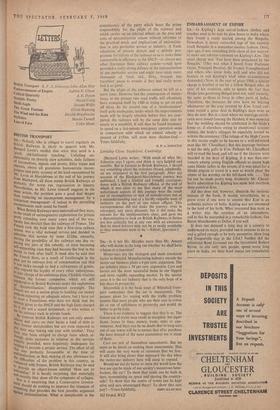British Transport K. F. A.
Embarrassment of Empire Critical Quarterly Scottish Poetry Shell-Angle
The Great Fortune
The Wind and the Rain Stylistics
Loss of Face
Johnston, John Allan May Sudhin N. G hose A. E. Dyson David Craig Jerome Willis Olivia Manning Neville Braybrooke Martin Turnell Colin Mann
BRITISH TRANSPORT
SIR,—Nobody who is obliged to travel regularly on British Railways is likely to quarrel with Mr. i Bernard Levin's verdict that what they need is a good, old-fashioned lynching.' Unfailing un- punctuality on drearily slow schedules, daily failures of IOCOmotives, signals and points, filthy trains and stations, above all gratuitous bureaucratic incom- Peience and petty tyranny of the kind encountered by from Levin at Marylebone at the end of his journey troin Blackpool, all these stamp British Railways as Probably the worst run organisation in history. Nevertheless, as Mr. Levin himself suggests in the same article, the problem goes a good deal deeper than replacing an incompetent management by a competent management—if indeed in the prevailing circumstances such could be found. When British Railways were nationalised they were, as the result of unimaginative exploitation for private profit extending over many years and of the war, French less derelict than the railways of France. The rrench took the bold view that a first-class railway system was a vital national service and decided to subsidise this service by some £120m. annually, leaving the possibility of the railways one day becoming '`'`-stiPnorting once they had become the best in the vv. orld, to look after itself. It must also be said that the French State, as a result of forethought in the past, got its railways free of compensation and that It was lucky enough to find a railwayman of genius, twho enjoyed the loyalty of every other railwayman, take charge of its ambitious plan. Childish rivalries between the former companies, which are still Pandered to in British Railways under the euphemism „f 'decentralisation,' disappeared overnight. The French are not a nation given to handing out money twahout expecting an adequate return, but I have yet 1neet a Frenchman who does not think that the b".1dY given to the SNCF and the high fares charged
itare not a sound investment, or who wishes to see his /, railways back in private hands.
Contrast British Railways arc not only unsub- t,'1,sed and carry on their backs a load of debt to their former shareholders but are even expected to Tildy their way 'taking one year with another.' They tbave also been obliged to charge fares which . al- a,°,11gh quite excessive in relation to the services h,1111Y provided, were hopelessly inadequate for tb`•'Ome to provide a proper service. The effect of all Was perfectly foreseeable at the time of • tb-‘10nalisation, so that, making all due allowance for c:.thilieulties of the problem in this country, as to 'Pared with France, British Railways may be said t„„Provide an object-lesson entitled 'How not. to a'onalise.' It is hardly surprising that materially riclisi morally they show all the symptoms of collapse. ti °I. is it surprising that a Conservative Govern- ent
should do nothing to improve the situation of
something that provides the best possible argument 4ainst nationalisation. What is inexplicable is the
complacency of the party which bears the prime responsibility for the plight of the railways and which carries on an internal debate on the pros and cons of nationalisation almost withoUt reference to the practical needs and implications of nationalisa- tion in any particular service or industry. A frank admission of present defects and a definite pro- gramme for reform of the railways so as to make them comparable inefficiency to the SNCF—or almost any other European State railway system—could have provided a really strong defence of the nationalisation of one particular service and might have made many thousands of 'tired, sick, filthy, bruised, late travellers' pause to wonder if they had really never had it so good. But the 'plight of the railways cannot be left as a party issue. However fast the construction of motor- ways, at the present rate road traffic will effectively have strangled itself by 1980 in trying to get on and off them. By the present rate of a 'modernisation' itself quite inadequate, under which the improvements made will be largely obsolete before they are com- pleted, the railways will by the same date also be nearly at a standstill. It will then be found necessary to spend on a last-minute emergency operation sums in comparison with which an annual subsidy at present of £150m. will seem mere chicken-feed.- Yours faithfully, K. F. A. JOHNSTON Lordship Close, Stapleford, Cambridge
[Bernard Levin writes: 'With much of what Mr. Johnston says I agree, and think it very helpful and sensible. But in fairness to British Railways, I should say something about the strictures (based, admittedly, on my strictures) in his first paragraph. After my account of the Blackpool-Marylebone journey was published, 1 had a fruitful and friendly correspon- dence with a British Railways official, at the end of which it was clear to me that many of the most unfortunate aspects of this journey were the result not of incompetence or lack of consideration but of a misunderstanding and of a hardly culpable want of initiative on the part of one minor official. This correspondence did not make the journey, even in retrospect, any more pleasant; but it did make the reasons for the unpleasantness clear, and gave me a determination to look on British Railways in future not less critically but at any rate with an awareness that its worst horrors may not be as easily avoidable as they sometimes seem to be.'--Editor, Spectator.]










































 Previous page
Previous page